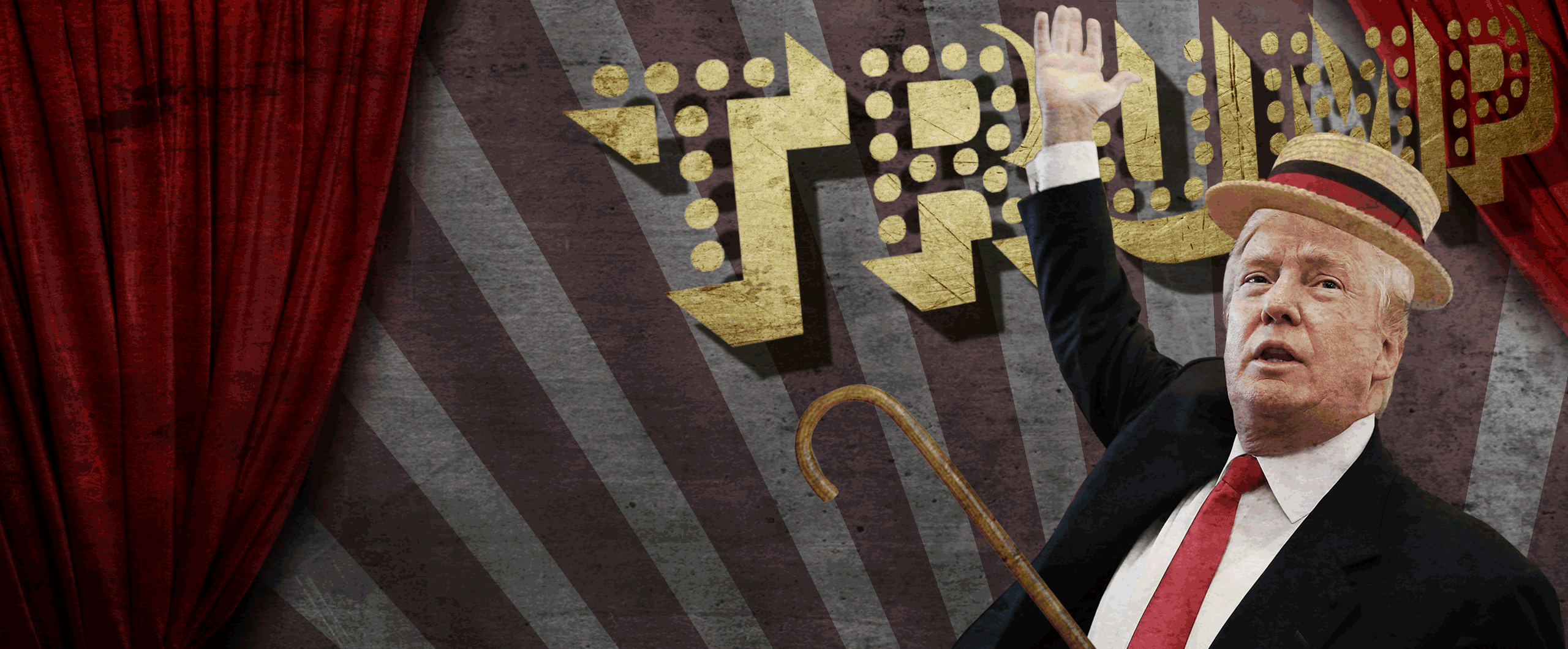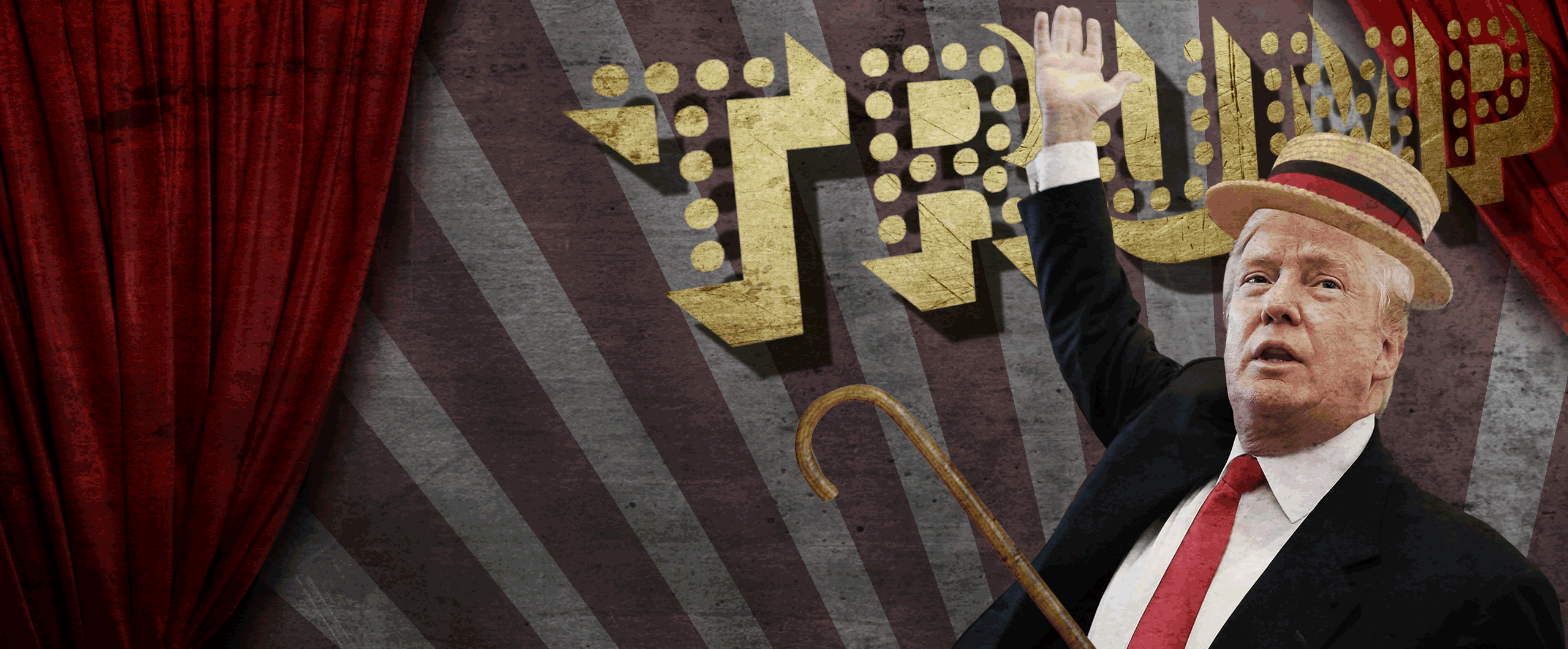Donald Trump, the Last of the Great Vaudevillians
The presidential hopeful and loudmouth provocateur is reviving a long-lost, much-needed Jewish tradition




Whatever else he may be—real-estate franchise ringmaster, reality show boss, the maharaja of merchandise, the GOP’s front-runner for now—Donald Trump, who will take his place onstage tonight for the first of too many debates pitting Republican presidential hopefuls against one another, is also heir to a precious Jewish tradition. He will, most likely, not be our next commander in chief; but he is, perhaps, our last great Vaudevillian.
How else could a New York billionaire—not historically the demographic with which most Americans warmly identify—rise to national prominence? From the first, as he emerged from the mists of Queens into Manhattan and national prominence, Trump needed a shtick. It was then that he seemed to have an important realization, perhaps the most substantial one of his career: Of all of America’s industries, he intuited, the entertainment industry was the only one truly attuned to the nation’s natural rhythms. Politics, business, all of the rest were just playing catch-up. To succeed, he needed to ham it up.
It was the same realization that men like Benjamin Franklin Keith, often hailed as the father of Vaudeville, had a century before. A rapidly industrializing country, Keith understood, needed distractions that had as much verve and audacity as its marketplaces. He needed to appeal to the same scrum of newly comfortable Americans who were now partaking in the hyperventilated making and buying and selling of stuff that was fueling so much quick growth. Rather than the medicine shows and the fairs and the minstrel acts that crisscrossed the country, often remaining regional attractions, Keith began to champion acts that were simultaneously titillating and clean. He understood the same fundamental thing the impresarios of rock ’n’ roll would fathom 50 years later, namely that the key to making it in America was giving its middle class just enough thrills. Following this dictum, midgets were dispatched to dance on stage, say, but the words “hell” and “damn” were strictly forbidden. Keith also realized that, on these shores, more was always more: His first theater, Boston’s Bijou, was a marvel of gilded excess, the first such establishment in the United States to be lighted by electricity, a temple to opulence that made sure the show started as soon as you walked through the door.
Stroll in to Fifth Avenue’s Trump Tower and you’ll get the same golly-gee feeling. No matter how many times you’ve been, or how many other splendid buildings you’ve had the pleasure of visiting, the Tower—like all other Trump properties—will overwhelm you. That’s because it is not so much a building as an advertisement, a statement of intent, a promise of wonders to come. In true Vaudeville fashion, the hype’s half the show.
Not that the show itself disappoints. You may think that American politics is too much of a circus; Trump’s genius lies in realizing it wasn’t circus enough. The same people who guzzle down raunchy entertainment aren’t going to flip a channel and expect their elected officials to act like Lincoln and Douglas. They’re going to want to explore their anxieties and their dreams in a way that’s both safe and arousing. It’s why we have Breaking Bad. And it’s why we have Donald Trump. As racial tensions simmer, his co-contenders offer little but platitudes and empty promises of big tents and happy feelings. Trump, in his outrageous comments about Mexican immigrants being rapists, say, is tapping into the very source of our discontent. His stupid statements aren’t designed to be insightful or even true; they’re designed to give a jolt.
Which, frankly speaking, we may need. The verdant parts of our popular culture that have not been turned arid by the harsh light of political correctness are governed by slick sophisticates, observational comedians who are great at exploring the mechanics of their own discomforts but not so great at delivering that all-American tradition of broad comedy through which so many generations found a place in the mainstream. When Irving Berlin, to name but one famous example, wrote “Cohen Owes Me 97 Dollars”—a humorous ditty about a Jewish businessman who, on his deathbed, can think of nothing but his debtors—he was inviting Jews to laugh at themselves and, by mocking the stereotype, dispel it, and become just a bit more American. And by turning prejudice into a punch line, he was also opening the door for the rest of the nation to see these marginal people as somehow acceptable, more mirthful than menacing.
Thankfully, immigrants are still knocking on this country’s doors, looking for the same old promise of life and liberty and happiness. I’m proud to be one of them. But the cultural machinery these days isn’t interested in common dreams. It’s interested in categorizing and preserving differences, in the molecules of gender and race and sexual orientation. Had “Cohen Owes Me 97 Dollars” been released today, you could count on scores of hot takes popping up online, decrying Berlin as a bigot. New arrivals have always looked at popular culture as a pathway to assimilation; the more we bow to the tyranny of sensitivity, the more likely we are to discover that the path is blocked.
This is why we had Vaudeville, and this is why we now have Trump. The Donald’s comments may not be so cleansing as the jokes of last century, but they’re cut from the same cloth. American politics, he’s realized, awaits its Vaudeville moment; sour with so many disappointments, we want someone who, like the Jewish jesters of a century ago, will stumble on to the stage dressed in an oversize persona and say outrageous things that start difficult conversations we don’t feel comfortable having because we want to believe we’re too well-heeled and nicely dressed for such base sentiments as distrust of immigrants. We’re not above any of it, of course, and Trump knows it, and we’re grateful to him for being so rude and so committed to the act. Look at him just so, and he’s Fanny Brice with thinner hair, quipping, like the original Funny Girl, that wrong is for other people.
Of course, this may not be an act at all, or it may end tonight with a thick curtain of respectability finally coming down over the fun and the bravado. It hardly matters. In his short run, Trump has given us a taste of a tradition we ourselves have carefully crafted and a reminder that sometimes, to have a serious talk, you need a bloated loudmouth who’s unafraid to offend.
***
Like this article? Sign up for our Daily Digest to get Tablet Magazine’s new content in your inbox each morning.
Liel Leibovitz is editor-at-large for Tablet Magazine and a host of its weekly culture podcast Unorthodox and daily Talmud podcast Take One. He is the editor of Zionism: The Tablet Guide.